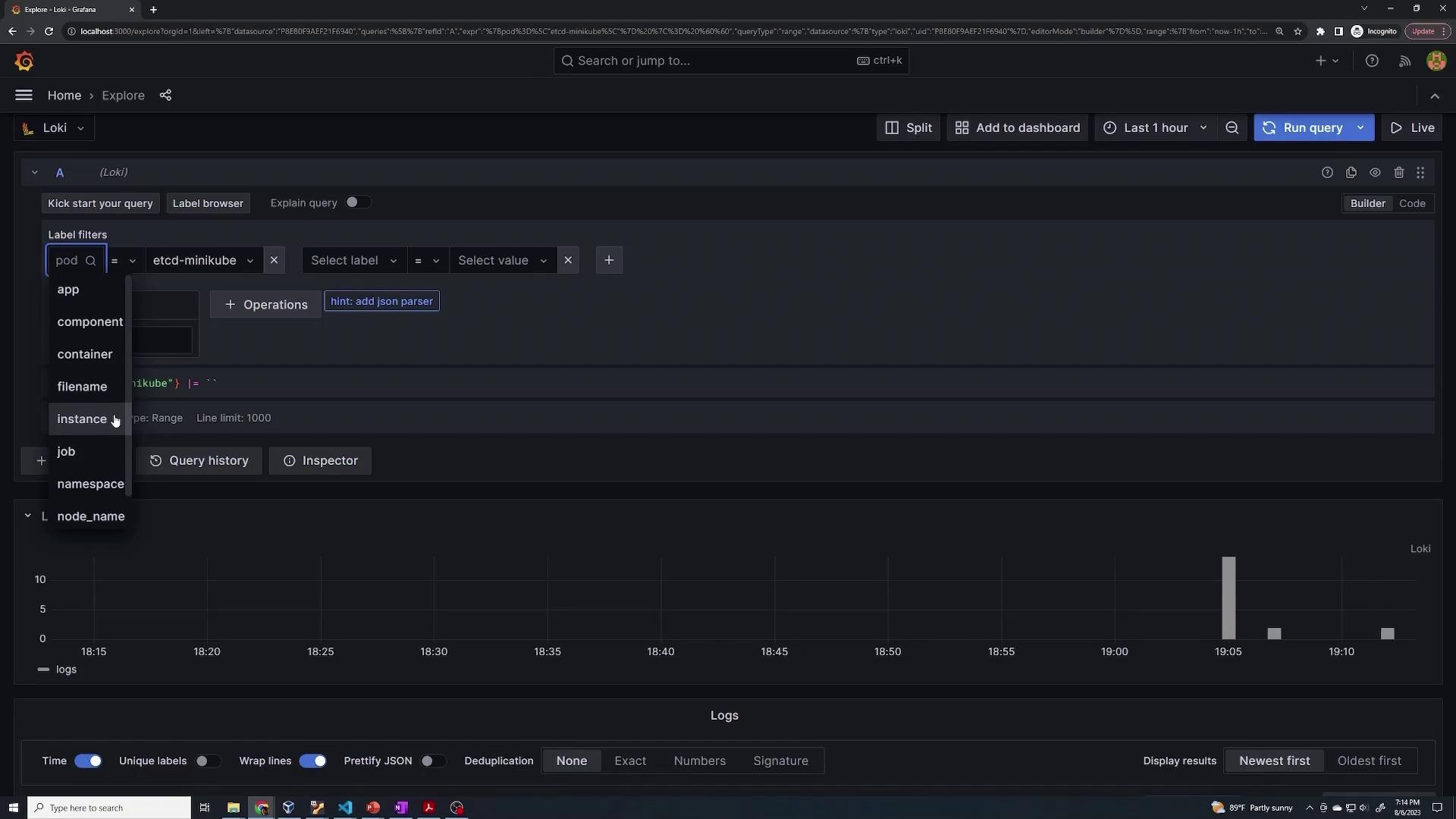Grafana Loki
Grafana Loki Essentials Part 2
Viewing Kubernetes logs
In this guide, we demonstrate how to view Kubernetes logs and review the default Promtail configurations used in a Loki-Grafana environment. You'll learn how to query logs in Grafana, inspect the Promtail configuration, and understand how Kubernetes service discovery and relabeling work together to provide an efficient logging solution.
Overview
This article covers querying pod logs in Grafana and reviewing Promtail configurations used within a Loki-Grafana setup. Ensure that your Loki stack is running and properly configured to collect logs from your Kubernetes environment.
Querying Pod Logs in Grafana
After navigating to the Explore section in Grafana, run a query to confirm that logs are being collected. When selecting a label (for example, "cd mini") and executing a query, you'll see various system labels—such as app, component, file name, instance, job, and namespace—that are automatically assigned to system pods (e.g., etcd server, kube API, kube controller) as well as to Loki, Grafana, and Promtail pods.
For example, to view logs for a specific pod (e.g., the etcd pod in the "minikube" namespace), use the following query:
{pod="etcd-minikube"} |= ``
This query returns all logs generated by the etcd pod, along with metadata labels such as node name, scrape job (defined within the Promtail configuration), and the source file path (typically located under /var/log/pods). You can further refine your queries by modifying or adding extra labels. For instance:
{pod="etcd-minikube"} |= ''
This setup illustrates how logs from containers and pods in a Kubernetes environment are collected and transmitted to Grafana via Loki and Promtail.

Reviewing Promtail Configurations
Next, we examine the Promtail configuration to understand how logs are discovered, processed, and transmitted.
Retrieving the Loki-Grafana Admin Password
First, verify the presence of the Loki-Grafana secret and retrieve the admin password:
kubectl get secret loki-grafana -o jsonpath="{.data.admin-password}"
Error from server (NotFound): secrets "loki-grafana" not found
kubectl get secret loki-grafana -o jsonpath="{.data.admin-password}"
VH5YTD0UdVkVHRXVuZCVJQUSoThqZ1g2QnlxblM3cUZRjV5Tg==
kubectl get secret loki-grafana -o jsonpath="{.data.admin-password}" | base64 --decode
Tqya7NQdWDGUuvqRANHE8jXByqan5g7FkN5yN
Checking Running Pods and Secrets
Ensure that your Loki stack is running by listing the current pods:
kubectl get pod
NAME READY STATUS RESTARTS AGE
loki-0 1/1 Running 0 10m
loki-grafana-5df4f4fd99-x4794 2/2 Running 0 10m
loki-promtail-bk9rj 1/1 Running 0 10m
kubectl get sec
Then, inspect the Promtail pod to examine mounts and container configuration. The Promtail container uses several volumes, including a configuration volume mounted from a secret and directories for Docker containers and pod logs.
Below is an excerpt from the Promtail pod configuration:
IP: 172.17.0.3
Controlled By: DaemonSet/loki-promtail
Containers:
promtail:
Container ID: docker://45bf8093b9c0cc175903ad18322dbfc52107e3f115ef2473913f6ab89eec576c
Image: docker.io/grafana/promtail:2.8.3
Image ID: docker-pullable://grafana/promtail@sha256:48e658500dd2107c1fa08c674472ad199b8dec220c1283fb6c9b990c49ae6f0
Port: 3101/TCP
Host Port: 0/TCP
Args:
-config.file=/etc/promtail/promtail.yaml
State: Running
Started: Sun, 06 Aug 2023 19:04:05 -0400
Ready: True
Restart Count: 0
Readiness: http-get http://http-metrics/ready delay=10s timeout=1s period=10s #success=1 #failure=5
Environment:
HOSTNAME: (v1:spec.nodeName)
Mounts:
/etc/promtail from config (rw)
/run/promtail from run (rw)
/var/lib/docker/containers from containers (ro)
/var/log/pods from pods (ro)
/var/run/secrets/kubernetes.io/serviceaccount from kube-api-access-s9fm7 (ro)
Conditions:
Type Status
Initialized True
Ready True
ContainersReady True
This Promtail container configuration is defined by a Kubernetes secret (named loki-promtail) that supplies the Promtail configuration file.
Inspecting the Volume Configuration
Review the volume configuration, which shows how various directories are mounted within the Promtail pod:
Conditions:
Type: Status
Initialized: True
Ready: True
ContainersReady: True
PodScheduled: True
Volumes:
config:
Type: Secret (a volume populated by a Secret)
SecretName: loki-promtail
Optional: false
run:
Type: HostPath (bare host directory volume)
Path: /run/promtail
HostPathType: ""
containers:
Type: HostPath (bare host directory volume)
Path: /var/lib/docker/containers
HostPathType: ""
pods:
Type: HostPath (bare host directory volume)
Path: /var/log/pods
HostPathType: ""
kube-api-access-s9fm7:
Type: Projected (a volume that contains injected data from multiple sources)
TokenExpirationSeconds: 3607
ConfigMapName: kube-root-ca.crt
ConfigMapOptional: <nil>
DownwardAPI: true
Decoding the Promtail Configuration
To inspect the actual Promtail configuration, retrieve and decode the secret:
kubectl get secret loki-promtail -o jsonpath="{.data.promtail\.yaml}"
Then decode the secret’s content using base64. The decoded configuration outlines both client and scrape settings. For example, a snippet of the configuration is:
- __meta_kubernetes_pod_container_name:
target_label: container
- action: replace
replacement: /var/log/pods/*$1/*.log
separator: /
source_labels:
- __meta_kubernetes_pod_uid
- __meta_kubernetes_pod_container_name
target_label: __path__
- action: replace
regex: true/(.*)
replacement: /var/log/pods/*$1/*.log
separator: /
source_labels:
- __meta_kubernetes_pod_annotationpresent_kubernetes_io_config_hash
- __meta_kubernetes_pod_annotation_kubernetes_io_config_hash
- __meta_kubernetes_pod_container_name
target_label: __path__
limits_config:
tracing:
enabled: false
This configuration instructs Promtail on where to locate log files (typically under /var/log/pods) and how to assign labels based on the pod’s metadata.
Understanding the Scrape Configuration
The scrape configuration uses Kubernetes service discovery to locate all pods and applies relabeling rules to standardize log labels. An excerpt of the scrape configuration follows:
- cri: {}
kubernetes_sd_configs:
- role: pod
relabel_configs:
- source_labels:
- __meta_kubernetes_pod_controller_name
regex: ([0-9a-z-]{8,10})?
action: replace
target_label: __tmp_controller_name
- source_labels:
- __meta_kubernetes_pod_label_app_kubernetes_io_name
- __meta_kubernetes_pod_label_app
- __tmp_controller_name
- __meta_kubernetes_pod_name
regex: ^*([^\-]+)(;.*)?$
action: replace
target_label: app
- source_labels:
- __meta_kubernetes_pod_label_app_kubernetes_io_instance
- __meta_kubernetes_pod_label_instance
regex: ^*([^\-]+)(;.*)?$
action: replace
target_label: instance
- source_labels:
- __meta_kubernetes_pod_label_app_kubernetes_io_component
- __meta_kubernetes_pod_label_component
regex: ^*([^\-]+)(;.*)?$
action: replace
target_label: component
These relabeling rules ensure that critical metadata is preserved in the logs, making it easier to query and manage log data effectively in Grafana.
Key Takeaway
Using Kubernetes service discovery combined with relabeling rules enables Promtail to efficiently locate pods and standardize log labels, ensuring a seamless log monitoring experience in Grafana.
By following these steps and reviewing the configurations, you can monitor your Kubernetes environment's logs with Loki, Promtail, and Grafana effectively.
Additional Resources
Happy logging!
Watch Video
Watch video content